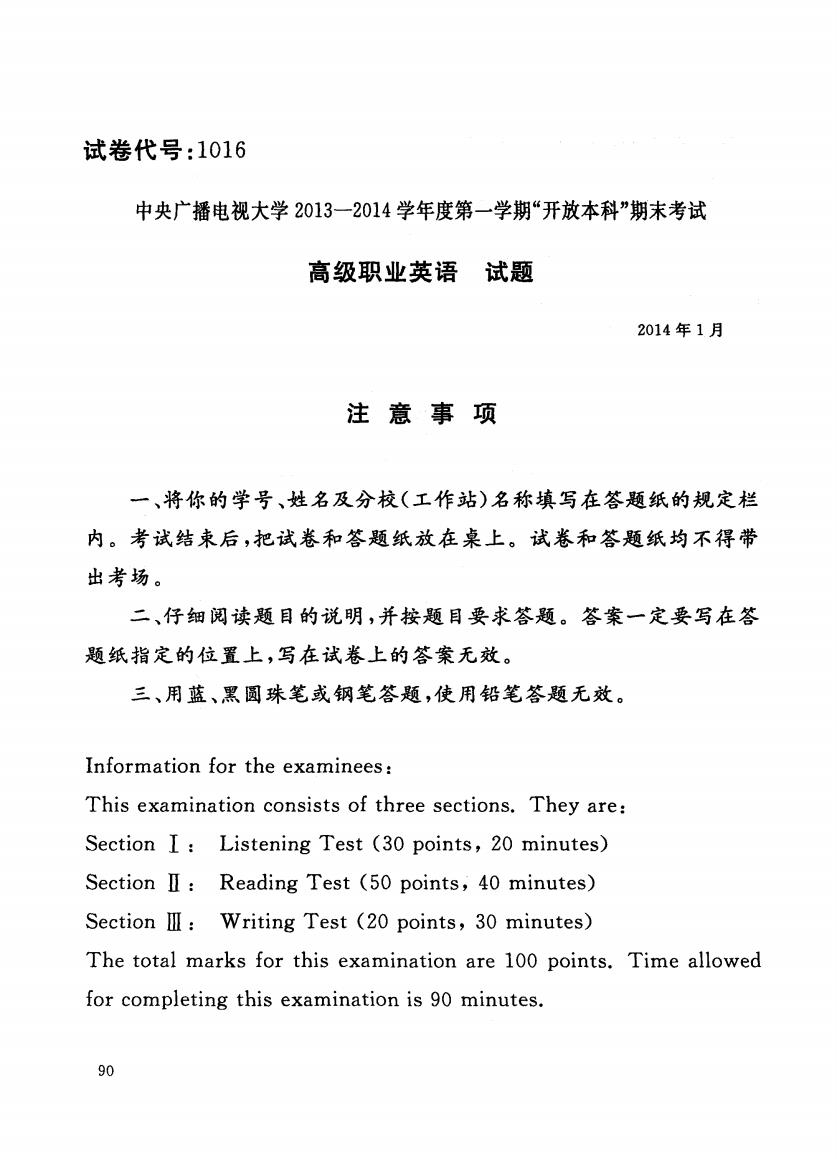
试卷代号:1016 中央广播电视大学2013一2014学年度第一学期“开放本科”期末考试 高级职业英语试题 2014年1月 注意事项 一、将你的学号、姓名及分校(工作站)名称填写在答题纸的规定栏 内。考试结束后,把试卷和答题纸放在桌上。试卷和答题纸均不得带 出考场。 二、仔细阅读题目的说明,并按题目要求答题。答案一定要写在答 题纸指定的位置上,写在试卷上的答案无效。 三、用蓝、黑圆珠笔或钢笔答题,使用铅笔答题无效。 Information for the examinees: This examination consists of three sections.They are: Section I:Listening Test (30 points,20 minutes) Section II:Reading Test (50 points,40 minutes) Section I:Writing Test (20 points,30 minutes) The total marks for this examination are 100 points.Time allowed for completing this examination is 90 minutes. 90
试卷代号 中央广播电视大学 4学年度第一学期"开放本科"期末考试 高级职业英语试题 2014 年1 注意事项 一、将你的学号、姓名及分校(工作站〉名称填写在答题纸的规定栏 内。考试结束后,把试卷和答题纸放在桌上。试卷和答题纸均不得带 出考场。 二、仔细阅读题目的说明,并按题目妥求答题。答案一定要写在答 题纸指定的位置上,写在试卷上的答案元效。 三、用蓝、黑圆珠笔或钢笔答题,使用铅笔答题元效。 Information for the examinees: This examination consists of three sections. They are: Section I: Listening Test (30 points, 20 minutes) Section IT: Reading Test (50 points, 40 minutes) Section ill: Writing Test (20 points, 30 minutes) The total marks for this examination are 100 points. Time allowed for completing this examination is 90 minutes. 90
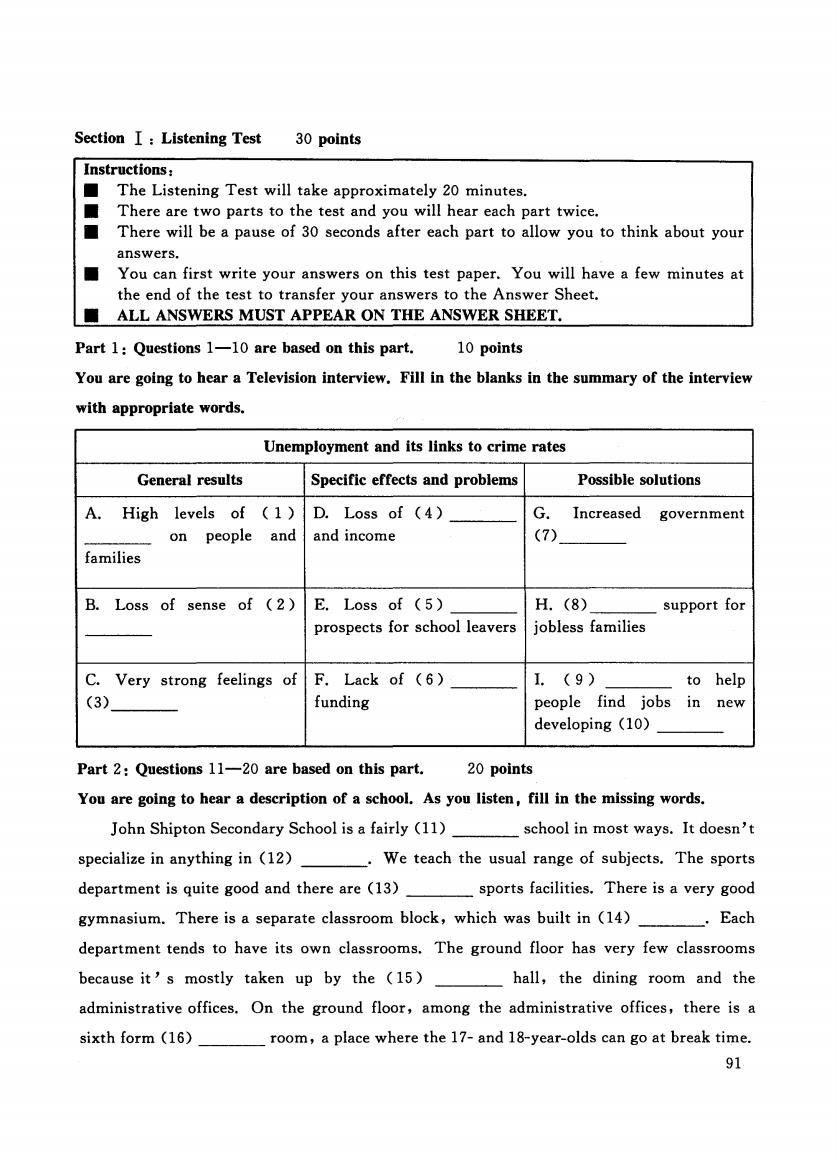
Section I:Listening Test 30 points Instructions: ■ The Listening Test will take approximately 20 minutes. There are two parts to the test and you will hear each part twice. There will be a pause of 30 seconds after each part to allow you to think about your answers. You can first write your answers on this test paper.You will have a few minutes at the end of the test to transfer your answers to the Answer Sheet. ALL ANSWERS MUST APPEAR ON THE ANSWER SHEET. Part 1:Questions 1-10 are based on this part. 10 points You are going to hear a Television interview.Fill in the blanks in the summary of the interview with appropriate words. Unemployment and its links to crime rates General results Specific effects and problems Possible solutions A.High levels of (1) D.Loss of (4) G. Increased government on people and and income (7) families B. Loss of sense of (2) E.Loss of (5) H.(8) support for prospects for school leavers jobless families C.Very strong feelings of F.Lack of (6) 1.(9) to help (3) funding people find jobs in new developing (10) Part 2:Questions 11-20 are based on this part. 20 points You are going to hear a description of a school.As you listen,fill in the missing words. John Shipton Secondary School is a fairly (11) school in most ways.It doesn't specialize in anything in (12).We teach the usual range of subjects.The sports department is quite good and there are (13) sports facilities.There is a very good gymnasium.There is a separate classroom block,which was built in (14).Each department tends to have its own classrooms.The ground floor has very few classrooms because it's mostly taken up by the (15) hall,the dining room and the administrative offices.On the ground floor,among the administrative offices,there is a sixth form (16) room,a place where the 17-and 18-year-olds can go at break time. 91
Section I : Listening Test 30 points Instructions, • The Listening Test will take approximately 20 minutes. • There are two parts to the test and you will hear each part twice. • There will be a pause of 30 seconds after each part to allow you to think about your answers. • You can first write your answers on this test paper. You will have a few minutes at the end of the test to transfer your answers to the Answer Sheet. • ALL ANSWERS MUST APPEAR ON THE ANSWER SHEET. Part 1: Qu臼tions 1-10 are based on this part. 10 points You are going to hear a Television interview. Fill in the blanks in the summary of the interview with appropriate words. Unemployment and its links to crime rates General results Specific effects and problems Possible solutions A. High levels of ( 1 ) D. Loss of (4) G. Increased government on people and and income (7) families B. Loss of sense of (2) E. Loss of (5) H. (8) support for prospects for school leavers jobless families C. Very strong feelings of F. Lack of (6) 1. ( 9 ) to help (3) funding people find jobs In new developing (10) Part 2: Qu创ions 11 一20 are based on this part. 20 points You are going to hear a description of a school. As you listen 但II in the missing words. John Shipton Secondary School is a fairly (11) school in most ways. It doesn' t specialize in anything in (1 2) . We teach the usual range of subjects. The sports department is quite good and there are (1 3) sports facilities. There is a very good gymnasium. There is a separate classroom block , which was built in (14) Each department tends to have its own classrooms. The ground floor has very few classrooms because it' s mostly taken up by the (15) hall , the dining room and the administrative offices. On the ground floor , among the administrative offices, there is a sixth form (16) room , a place where the 17- and 18-year-olds can go at break time. 91
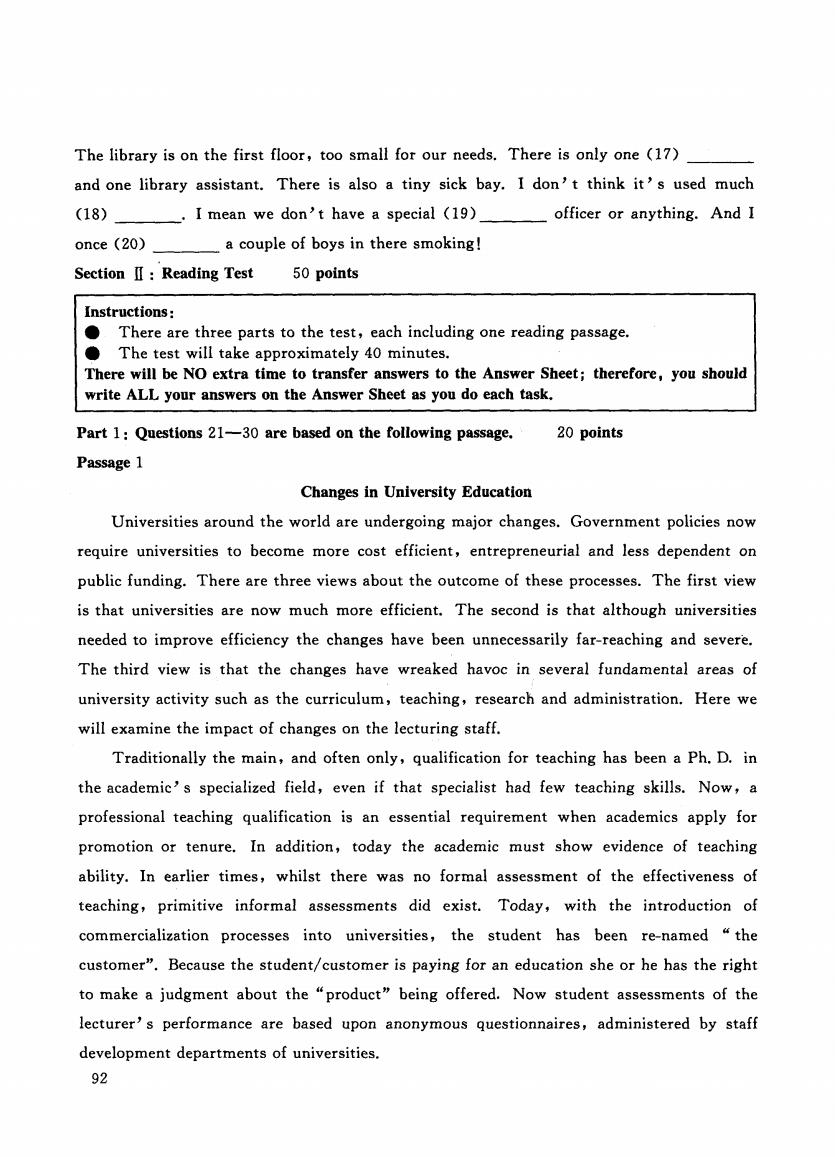
The library is on the first floor,too small for our needs.There is only one (17) and one library assistant.There is also a tiny sick bay.I don't think it's used much (18) I mean we don't have a special (19) officer or anything.And I once(20) a couple of boys in there smoking! SectionⅡ:Reading Test 50 points Instructions: O There are three parts to the test,each including one reading passage. The test will take approximately 40 minutes. There will be NO extra time to transfer answers to the Answer Sheet;therefore,you should write ALL your answers on the Answer Sheet as you do each task. Part 1:Questions 21-30 are based on the following passage. 20 points Passage 1 Changes in University Education Universities around the world are undergoing major changes.Government policies now require universities to become more cost efficient,entrepreneurial and less dependent on public funding.There are three views about the outcome of these processes.The first view is that universities are now much more efficient.The second is that although universities needed to improve efficiency the changes have been unnecessarily far-reaching and severe. The third view is that the changes have wreaked havoc in several fundamental areas of university activity such as the curriculum,teaching,research and administration.Here we will examine the impact of changes on the lecturing staff. Traditionally the main,and often only,qualification for teaching has been a Ph.D.in the academic's specialized field,even if that specialist had few teaching skills.Now,a professional teaching qualification is an essential requirement when academics apply for promotion or tenure.In addition,today the academic must show evidence of teaching ability.In earlier times,whilst there was no formal assessment of the effectiveness of teaching,primitive informal assessments did exist.Today,with the introduction of commercialization processes into universities,the student has been re-named the customer".Because the student/customer is paying for an education she or he has the right to make a judgment about the "product"being offered.Now student assessments of the lecturer's performance are based upon anonymous questionnaires,administered by staff development departments of universities. 92
The library is on the first floor , too small for our needs. There is only one (17) and one library assistant. There is also a tiny sick bay. I don' t think it' s used much (1 8 ) once (20) . I mean we don' t have a special (19) a couple of boys in there smoking! officer or anything. And I Section II : Reading Test 50 points Instructions: • There are three parts to the test , each including one reading passage. • The test will take approximately 40 minutes. There will be NO extra time to transfer answers to the Answer Sheet; therefore , you should write ALL your answers on the Answer Sheet as you do each task. Part 1: Qu臼tions 21-30 are based on the following 吨e. 描踊 1 Changes in University Education 20 points Universities around the world are undergoing major changes. Government policies now require universities to become more cost efficient , entrepreneurial and less dependent on public funding. There are three views about the outcome of these processes. The first view is that universities are now much more efficient. The second is that although universities needed to improve efficiency the changes have been unnecessarily far-reaching and severe. The third view is that the changes have wreaked havoc in several fundamental areas of university activity such as the curriculum, teaching , research and administration. Here we will examine the impact of changes on the lecturing staff. Traditionally the main , and often only , qualification for teaching has been a Ph. D. in the academic' s specialized field , even if that specialist had few teaching skills. Now , a professional teaching qualification is an essential requirement when academics apply for promotion or tenure. In addition , today the academic must show evidence of teaching ability. In earlier times, whilst there was no formal assessment of the effectiveness of teaching , primitive informal assessments did exist. Today , with the introduction of commercialization processes into universities, the student has been re-named "the customer". Because the student/customer is paying for an education she or he has the right to make a judgment about the "product" being offered. Now student assessments of the lecturer' s performance are based upon anonymous questionnaires, administered by staff development departments of universities. 92
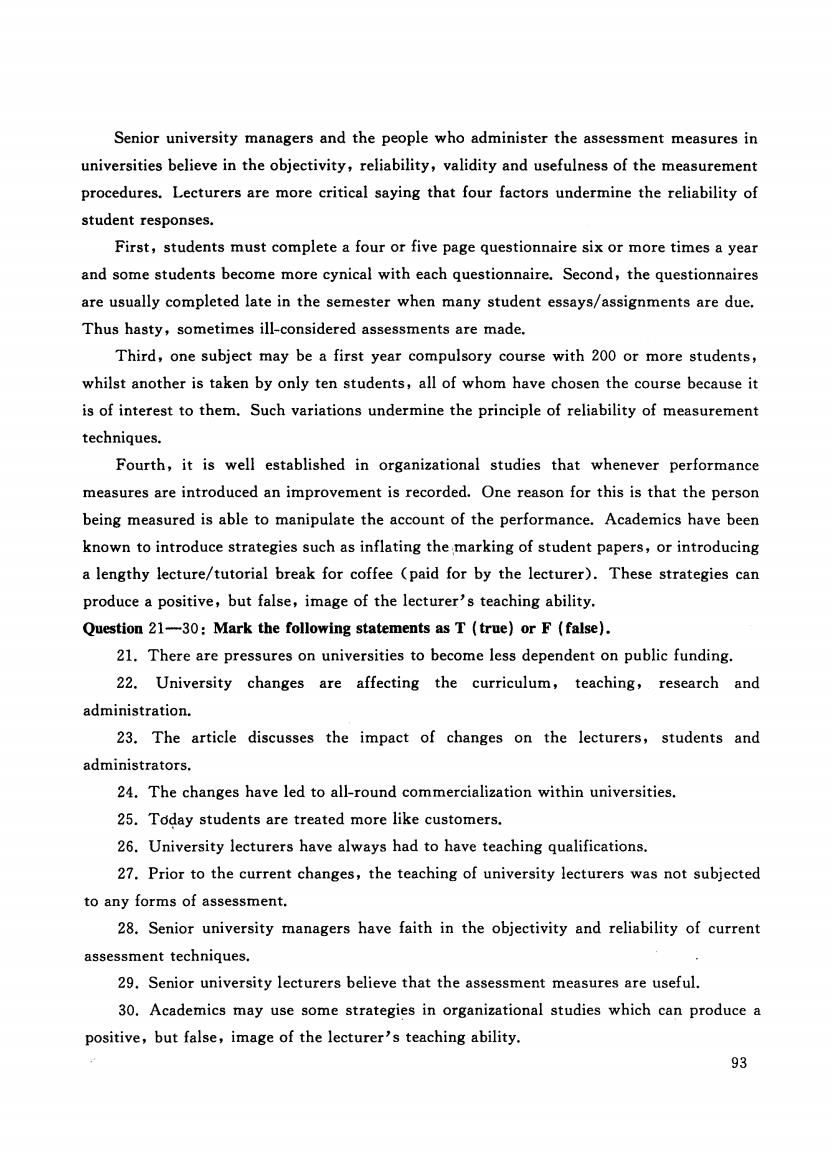
Senior university managers and the people who administer the assessment measures in universities believe in the objectivity,reliability,validity and usefulness of the measurement procedures.Lecturers are more critical saying that four factors undermine the reliability of student responses. First,students must complete a four or five page questionnaire six or more times a year and some students become more cynical with each questionnaire.Second,the questionnaires are usually completed late in the semester when many student essays/assignments are due. Thus hasty,sometimes ill-considered assessments are made. Third,one subject may be a first year compulsory course with 200 or more students, whilst another is taken by only ten students,all of whom have chosen the course because it is of interest to them.Such variations undermine the principle of reliability of measurement techniques. Fourth,it is well established in organizational studies that whenever performance measures are introduced an improvement is recorded.One reason for this is that the person being measured is able to manipulate the account of the performance.Academics have been known to introduce strategies such as inflating the marking of student papers,or introducing a lengthy lecture/tutorial break for coffee (paid for by the lecturer).These strategies can produce a positive,but false,image of the lecturer's teaching ability. Question 21-30:Mark the following statements as T (true)or F(false). 21.There are pressures on universities to become less dependent on public funding. 22.University changes are affecting the curriculum,teaching,research and administration, 23.The article discusses the impact of changes on the lecturers,students and administrators. 24.The changes have led to all-round commercialization within universities. 25.Today students are treated more like customers. 26.University lecturers have always had to have teaching qualifications. 27.Prior to the current changes,the teaching of university lecturers was not subjected to any forms of assessment. 28.Senior university managers have faith in the objectivity and reliability of current assessment techniques. 29.Senior university lecturers believe that the assessment measures are useful. 30.Academics may use some strategies in organizational studies which can produce a positive,but false,image of the lecturer's teaching ability. 93
Senior university managers and the people who administer the assessment measures in universities believe in the objectivity, reliability , validity and usefulness of the measurement procedures. Lecturers are more critical saying that four factors undermine the reliability of student responses. First , students must complete a four or five page questionnaire six or more times a year and some students become more cynical with each questionnaire. Second, the questionnaires are usually completed late in the semester when many student essays/assignments are due. Thus hasty , sometimes ill-considered assessments are made. Third, one subject may be a first year compulsory course with 200 or more students, whilst another is taken by only ten students, all of whom have chosen the course because it is of interest to them. Such variations undermine the principle of reliability of measurement techniques. Fourth , it is well established in organizational studies that whenever performance measures are introduced an improvement is recorded. One reason for this is that the person being measured is able to manipulate the account of the performance. Academics have been known to introduce strategies such as inflating the "marking of student papers, or introducing a lengthy lecture/tutorial break for coffee (paid for by the lecturer). These strategies can produce a positive , but false , image of the lecturer's teaching ability. Qu四tion 21-30: Mark the following statements as T (true) or F (false). 21. There are pressures on universities to become less dependent on public funding. 22. University changes are affecting the curriculum , teaching , research and administration. 23. The article discusses the impact of changes on the lecturers, students and administrators. 24. The changes have led to all-round commercialization within universities. 25. Tdc:lay students are treated more like customers. 26. University lecturers have always had to have teaching qualifications. 27. Prior to the current changes, the teaching of university lecturers was not subjected to any forms of assessment. 28. Senior university managers have faith in the objectivity and reliability of current assessment techniques. 29. Senior university lecturers believe that the assessment measures are useful. 30. Academics may use some strategies in organizational studies which can produce a positive , but false , image of the lecturer's teaching ability. 93
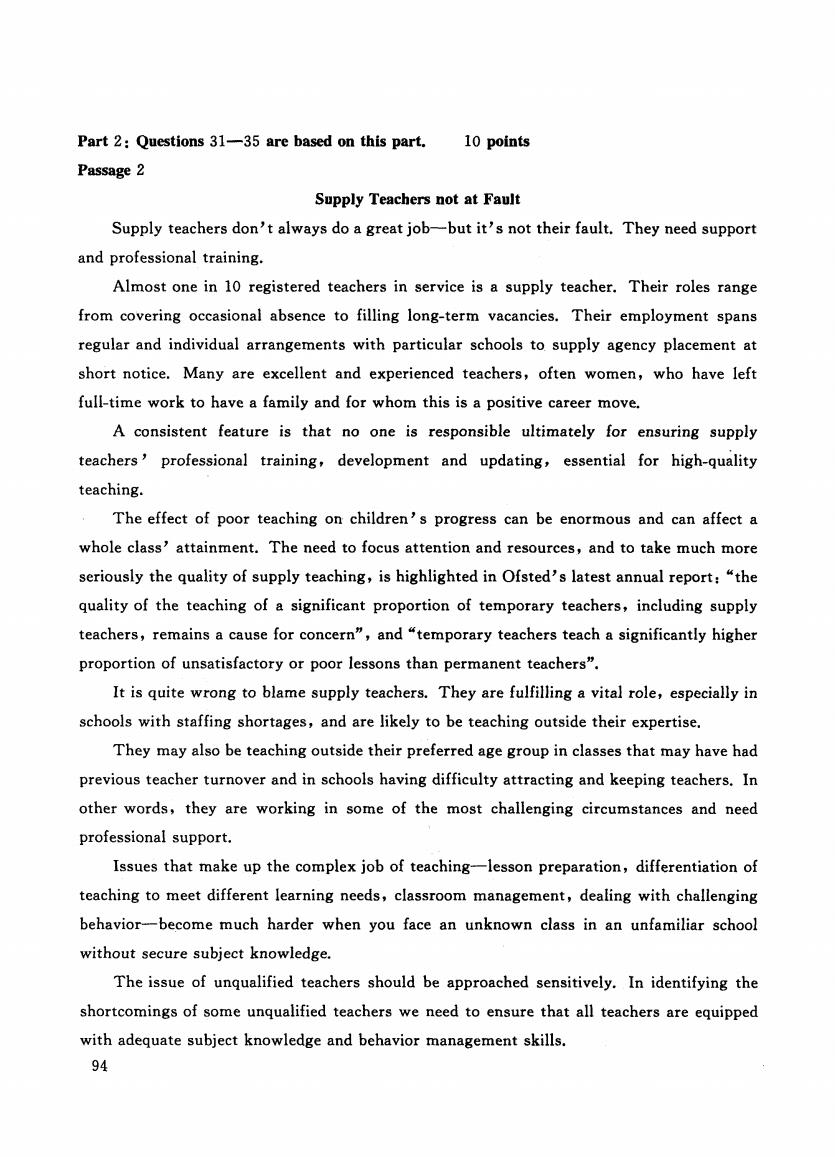
Part 2:Questions 31-35 are based on this part. 10 points Passage 2 Supply Teachers not at Fault Supply teachers don't always do a great job-but it's not their fault.They need support and professional training. Almost one in 10 registered teachers in service is a supply teacher.Their roles range from covering occasional absence to filling long-term vacancies.Their employment spans regular and individual arrangements with particular schools to supply agency placement at short notice.Many are excellent and experienced teachers,often women,who have left full-time work to have a family and for whom this is a positive career move. A consistent feature is that no one is responsible ultimately for ensuring supply teachers'professional training,development and updating,essential for high-quality teaching. The effect of poor teaching on children's progress can be enormous and can affect a whole class'attainment.The need to focus attention and resources,and to take much more seriously the quality of supply teaching,is highlighted in Ofsted's latest annual report:"the quality of the teaching of a significant proportion of temporary teachers,including supply teachers,remains a cause for concern",and "temporary teachers teach a significantly higher proportion of unsatisfactory or poor lessons than permanent teachers". It is quite wrong to blame supply teachers.They are fulfilling a vital role,especially in schools with staffing shortages,and are likely to be teaching outside their expertise. They may also be teaching outside their preferred age group in classes that may have had previous teacher turnover and in schools having difficulty attracting and keeping teachers.In other words,they are working in some of the most challenging circumstances and need professional support. Issues that make up the complex job of teaching-lesson preparation,differentiation of teaching to meet different learning needs,classroom management,dealing with challenging behavior-become much harder when you face an unknown class in an unfamiliar school without secure subject knowledge. The issue of unqualified teachers should be approached sensitively.In identifying the shortcomings of some unqualified teachers we need to ensure that all teachers are equipped with adequate subject knowledge and behavior management skills. 94
Part 2: Qu四tions 31-35 are based on this part. 描阳 2 10 points Supply Teachers not at Fault Supply teachers don' t always do a great job-but it's not their fault. They need support and professional training. Almost one in 10 registered teachers in service is a supply teacher. Their roles range from covering occasional absence to filling long-term vacancies. Their employment spans regular and individual arrangements with particular schools to supply agency placement at short notice. Many are excellent and experienced teachers, often women , who have left full-time work to have a family and for whom this is a positive career move. A consistent feature is that no one is responsible ultimately for ensuring supply teachers' professional training , development and updating , essential for high-quality teaching. The effect of poor teaching on children' s progress can be enormous and can affect a whole class' attainment. The need to focus attention and resources, and to take much more seriously the quality of supply teaching , is highlighted in Ofsted's latest annual report: "the qualityof the teaching of a significant proportion of temporary teachers, including supply teachers, remains a cause for concern" , and "temporary teachers teach a significantly higher proportion of unsatisfactory or poor lessons than permanent teachers". It is quite wrong to blame supply teachers. They are fulfilling a vital role , especially in schools with staffing shortages, and are likely to be teaching outside their expertise. They may also be teaching outside their preferred age group in classes that may have had previous teacher turnover and in schools having difficulty attracting and keeping teachers. In other words, they are working in some of the most challenging circumstances and need professional support. Issues that make up the complex job of teaching-lesson preparation , differentiation of teaching to meet different learning needs, classroom management , dealing with challenging behavior-become much harder when you face an unknown class in an unfamiliar school without secure subject knowledge. The issue of unqualified teachers should be approached sensitively. In identifying the shortcomings of some unqualified teachers we need to ensure that all teachers are equipped with adequate subject knowledge and behavior management skills. 94